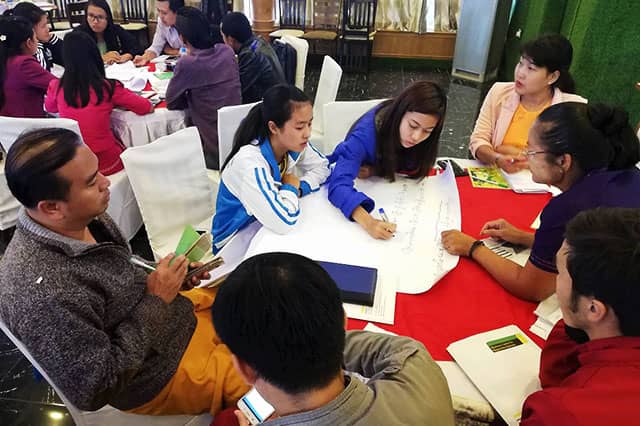Working with Community Groups in Shan State on Responsible Business and EIA

Hnin Wut Yee and Aung Kyaw Soe were speakers at a workshop in Taunggyi for civil society organizations on “Responsible Business and the Role of Environmental Impact Assessment (EIA)” on 7/8 June organized by Metta Development Foundation and Environmental Conservation and Farmer Development Organization (Shan).
Around 40 participants from different areas of Shan State attended, including representatives of Ethnic Armed Organisations (Pa-Oh National Liberation Army (PNLO) and Restoration Council of Shan State (RCSS), Farmer and Land Workers Union and community. MCRB’s presentations and group discussions focused on what responsible business is, including how business can ‘create shared value’ in a way which benefits both the business and the local community.
MCRB also explained what an EIA is and how it is undertaken, including the phases such as scoping of key issues, identifying potential impacts, analysing alternatives, data gathering, establishing an Environmental Management Plan (EMP) and Operational Grievance Mechanism, and monitoring. Also covered were legal requirements and good practice on public participation and the role which local civil society organisations (CSOs) can play.
In view of the importance of mining to Shan State, MCRB also presented key findings from its Mining Sector Wide Impact Assessment, published in March 2018, including an overview of the legal framework for mining, as well as the SWIA’s recommendations to CSOs. The Mining SWIA included field research on the limestone mining sector in Hopong township in Shan State.
Other presentations included Responsible Land Based Investment, and Involuntary Resettlement as well as an exercise on stakeholder mapping.
Participants were interested to know whether community members can undertake an EIA, how communities can know whether an EIA consultancy is officially registered , and whether EIAs by so-called expert third parties can be trusted as accurate and independent. Other questions included how to check on the quality of EIA investigations carried out by consultants, what an appropriate time frame for investigations would be, and whether a community can access a project’s Environmental Compliance Certificate, and what opportunities for legal redress a community has.
Read also
- Building Environmental Legal Advocacy Skills for Civil Society Leaders
- Investors Need to Identify their Impacts on Myanmar’s Biodiversity and Ecosystems Early On, to Avoid Cost and Conflict Later
- Building Understanding of EIA and Responsible Business for Civil Society Groups in Southern and Eastern Shan State
- Join MCRB and Thant Myanmar in the Battle to Beat Plastic Pollution
- Our Biggest Challenge as Consultants is Companies Refusing to Admit Projects Could Have Negative Impacts
 English
English မြန်မာ
မြန်မာ မြန်မာ (unicode)
မြန်မာ (unicode)








